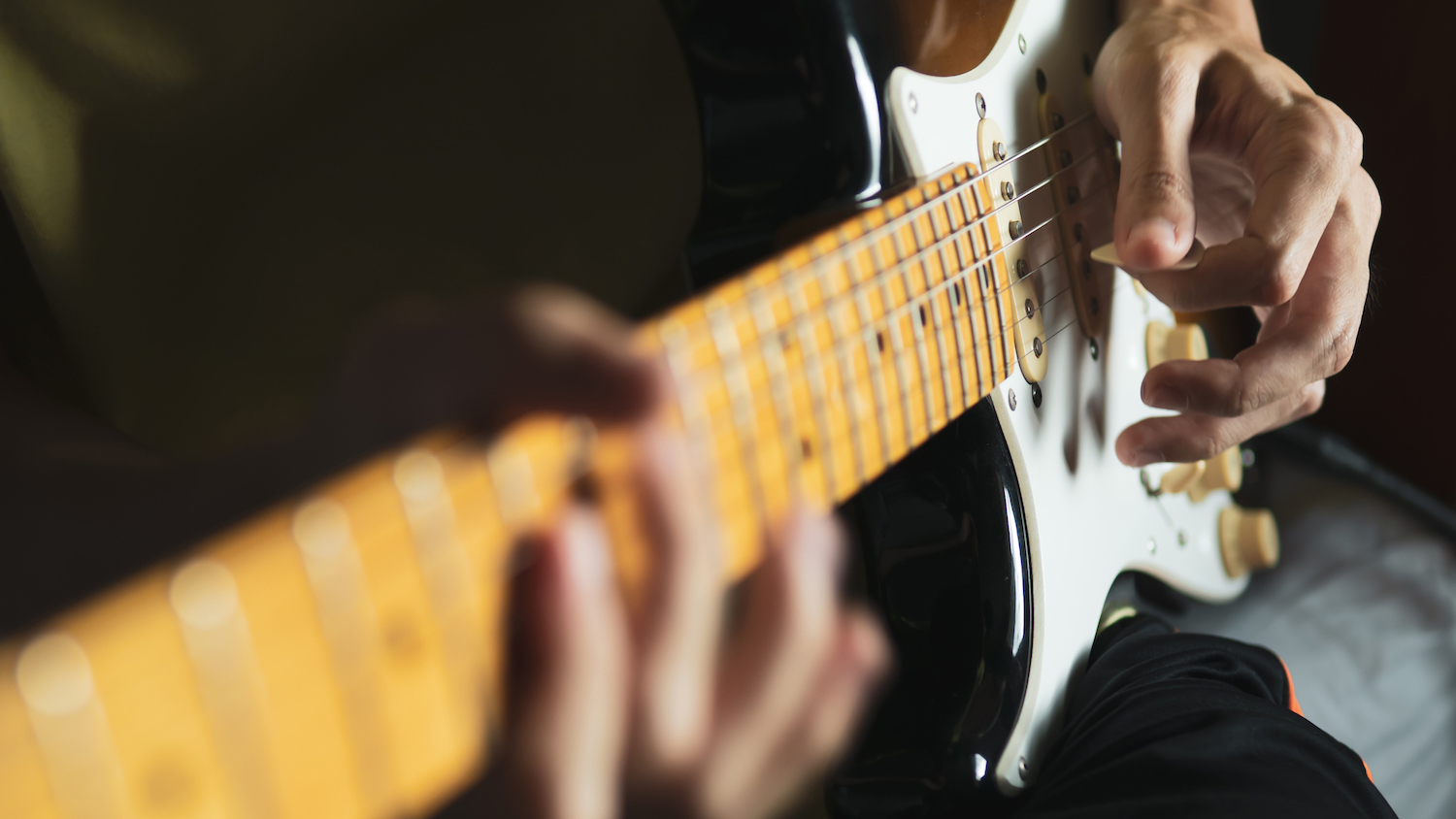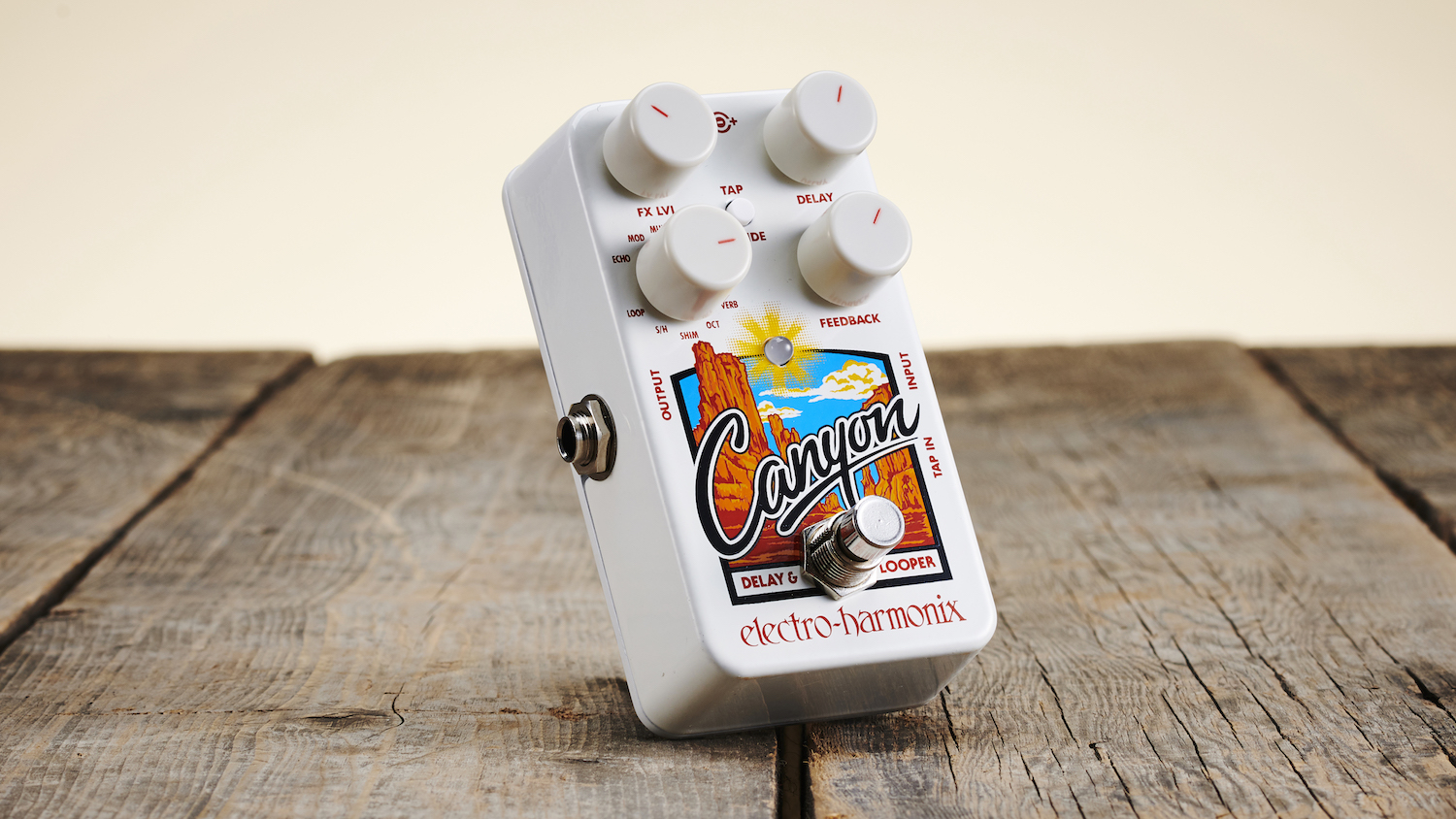Neck Deep guitarist Sam Bowden: 10 albums that changed my life
Inspirations and influence, from Oasis to Green Day and the Canadian band "that made me start thinking about how the gear I was using could make such a difference"
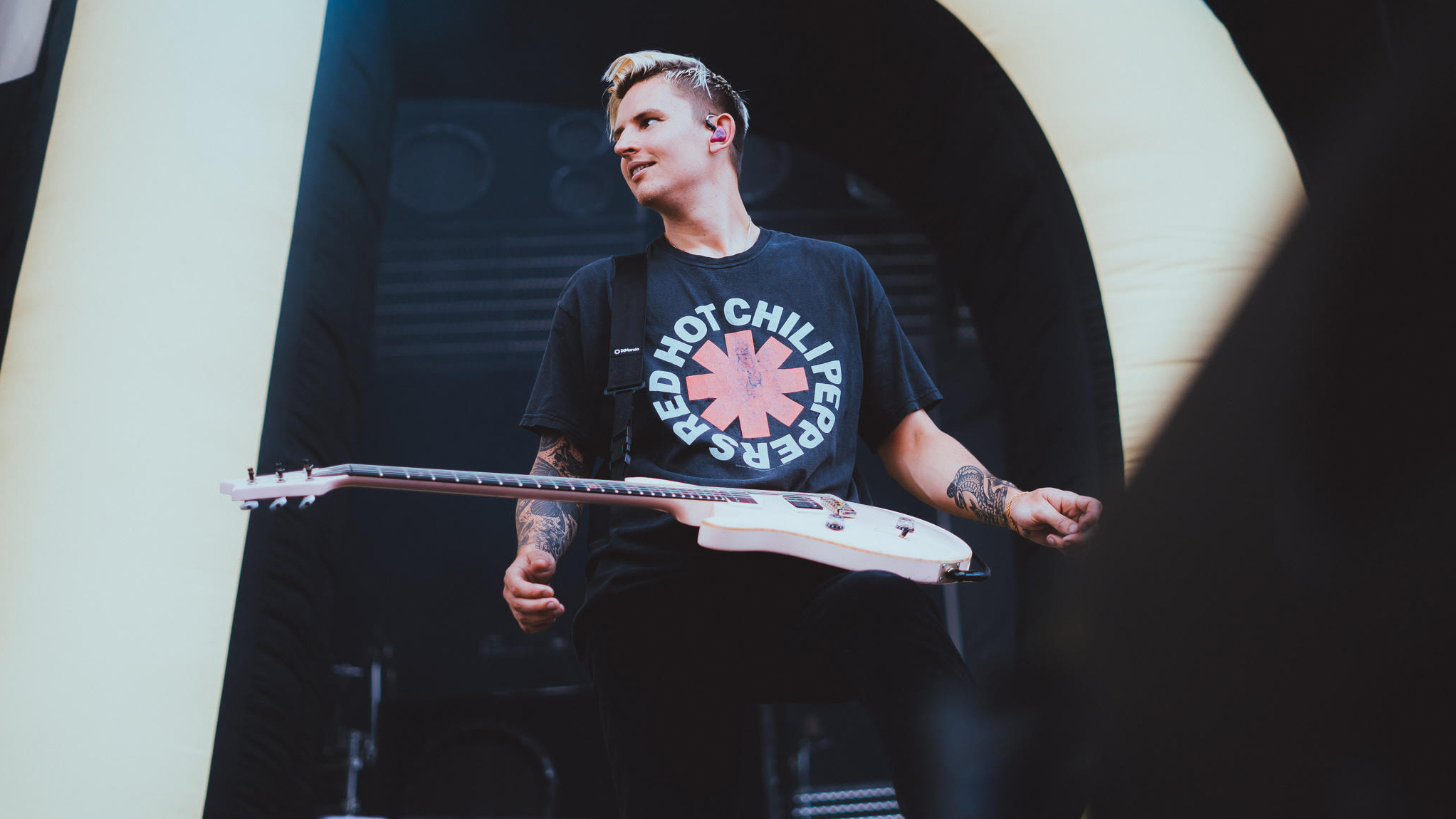
Want all the hottest music and gear news, reviews, deals, features and more, direct to your inbox? Sign up here.
You are now subscribed
Your newsletter sign-up was successful
“It’s very strange releasing an album amid all of this. But I think it could be worse. You could have no album to release and be at an absolute standstill. It’d be easy to just disappear into the abyss if you don’t have anything during this time.”
Neck Deep’s guitarist, Sam Bowden is on the phone to tell us about the albums that shaped his guitar playing, but first there’s the small matter of the band’s latest album, All Distortions Are Intentional to discuss. Released at the end of July as the UK starts to emerge from lockdown, it’s a strange time for any artist, but Neck Deep have returned with an 11-strong collection of songs recorded at Wales’ legendary (and currently on-the-market) Monow Valley with producer Matt Squire (Panic! At The Disco, Sum 41, Good Charlotte).
ADAI builds on the band’s successful and infectious blend of classic pop-punk, rock and pop, which is reflected in Sam’s choices, brimming with classic songwriting and power trio influences.
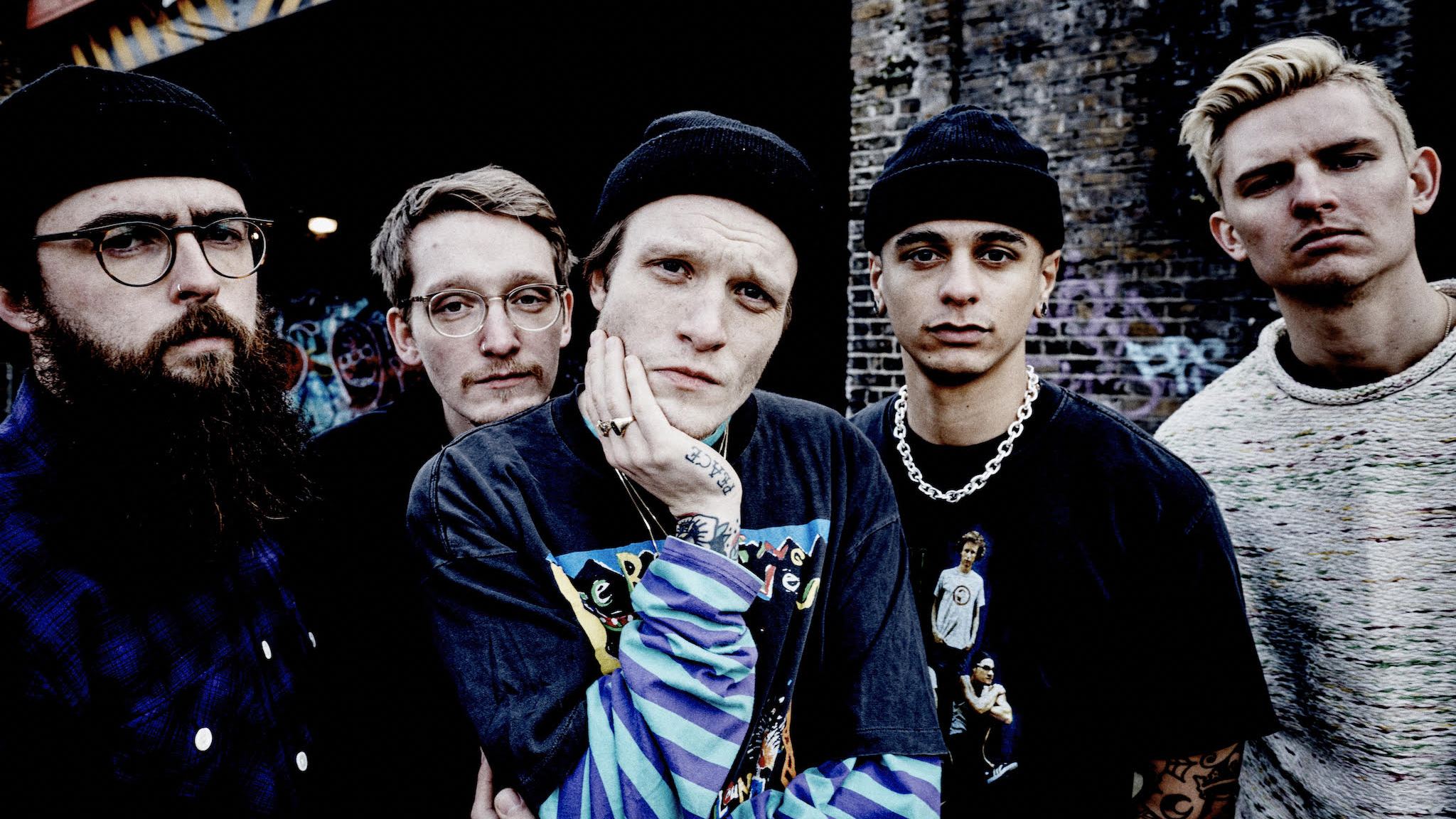
This is your second album with Neck Deep, how did the writing and recording compare to first time round for you?
“It was a lot more comfortable because on the first one it’d been hectic touring. There had only been little breaks in touring, and trying to follow Life’s Out To Get You is a thing in itself, like ‘Oh God, where do you take this? People are expecting something’. Lloyd was one of the core songwriters so without him in it, it felt a bit like ‘What are you gonna do?’.”
“So I was writing a bunch, but it was more difficult to write for that album than it was for this one because it was almost like, ‘Prove yourself’ to some degree. So I felt a lot more pressure on that, and I wasn’t really sure where the rest of the guys saw [it going]. I had my vision, but obviously I was semi-new to the band, so it was a tough spot to get there.”
“But on this album we’d been together so long, and had so many conversations about where we saw this album going. We wanted to be a lot more free and not put ourselves in a box of ‘That’s not pop-punk enough’.”
Want all the hottest music and gear news, reviews, deals, features and more, direct to your inbox? Sign up here.
"Having that open approach to writing made it a lot more comfortable”
“We’re into so much music, even Ben had been getting into a lot of bands that he kind of missed out on growing-up - The Beatles, Alice In Chains, Counting Crows. So we took an approach of, ‘Let’s just write what we want to write and with Ben’s vocal it’ll probably just sound like Neck Deep. So we just wrote a bunch of songs, and what Ben felt inspired by he’d write to. Having that open approach to writing made it a lot more comfortable.”
“Doing the album with Matt Squire was a breeze, he’s such a phenomenal guy, musician and producer. He just pulled the best out of us and it was honestly kind of effortless to some degree - obviously there’s a lot that goes into it - but there was so much less stress than when we did The Peace And The Panic.
“That album was done in LA, and it was like a 9am-6/7pm schedule, like ‘These are the hours that you’re rock and rollin’!’. Whereas this one we were in an old studio in the middle of Wales, there’s absolutely nothing there, barely any Wi-Fi and you can’t walk to any sort of establishment, so you’re living and breathing the record. The only thing there really is to do is hit instruments and that’s kind of it! You never lose focus.”
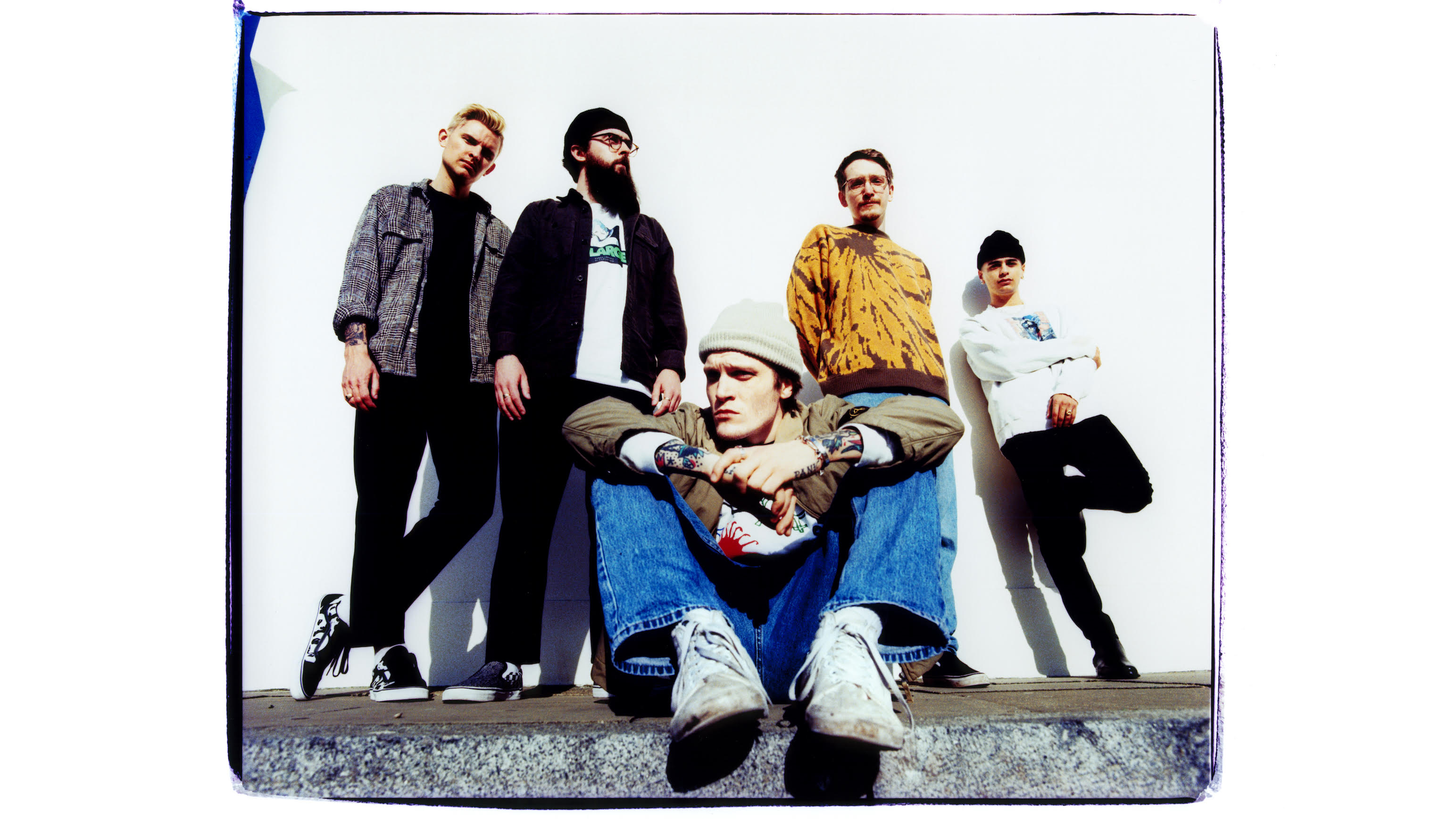
"When you’re growing up, the vision and the dream is living in a studio and creating a record the way they were made"
What was it like recording at Monow Valley?
“Monow Valley is sadly closed now. I think we were the last band to do an album there. It went up for sale and they were having people view it while we were there which was very strange.
"Before The Peace And The Panic we went there for two weeks for a sort of writing retreat. We went there because Oasis and Sabbath had been there. So we thought ‘Let’s go there and harness some of the previous powers that have been there!’.
“When you’re getting into music and watching documentaries of your favourite band and they’re making records, they weren’t doing it out of someone’s apartment in LA, or out of their bedrooms sending files across. That’s a great modern way of being able to work. It’s cost-effective and you can still get a great output. A bunch of Neck Deep stuff has been done that way, Like Wishful Thinking was done from Seb’s bedroom. But when you’re growing up, the vision and the dream is living in a studio and creating a record the way they were made.”
What gear did you take to the studio?
“I was using my PRS Custom 24, which they kindly built for me because I’m left-handed. They don’t make many left-handed guitars for stock, more for order so I got to have a custom made Custom 24. I tracked a few things with a Fender Strat, and I also used a Gibson Les Paul, but that was right-handed, I had to play upside-down on that!”
“Then amp-wise, we ended up having a bit of a nightmare! We got there and then on Day Two we blew two Marshall JCM 800s. We then blew two Kempers, and then we blew a Vox. So then we had to have a day off from recording pretty much immediately because we’d blown all these amps.
"So then Seb [Barlow] and West [Matt West, guitar] had to drive to Seb’s studio and pick up my touring Marshall JCM head. So we ended up doing pretty much the whole album through the Marshall, then we also took a clean DI from the Kemper for Seb when he was mixing just in case anything needed an additional tone dropping in.”
“I can’t really remember what pedals we used because they were from the studio. We’d just put a pedal in, try it, put another one in, try that. But we used a lot more fuzz than distortion on this one.
"I think with fuzz it almost doesn’t sound right on its own, but in context with everything it just sounds massive"
"We tried some Tube Screamers, we had an old Ibanez Tube screamer, and a modded one, and we were trying all sorts - ramping the gain up. But I think the fuzz pedals had a lot to do with the end sound. We wanted that sort of wider rock tone, and I think with fuzz it almost doesn’t sound right on its own, but in context with everything it just sounds massive.”
“Also, having the amp on full. For Lowlife we recorded with the amp on absolute maximum. I was stood in the studio tracking it and it was feeding back. I think to get that big sound where it’s like ‘That sounds massive, like the amp’s on full’ you just have to max everything out so that it feels like it when you’re listening to it.”

"By the time we were on to recording the third song, we’d already have a mix of the first song we’d tracked"
“Seb is Ben’s [Barlow, vocals] brother, and is now our bassist. He’s sort of been like a sixth member through the years, and he’s mixed a bunch of things. For this album, we had quite an unusual setup, recording as you would in the main room with Squire, then Seb had brought all his gear and was set up for mixing in another room at Monow.
“So once we had a full song done, Seb would take all the stems and start mixing. So by the time we were on to recording the third song, we’d already have a mix of the first song we’d tracked. So by the time we left the studio in mid-December, we were two songs short of a fully mixed album.
"It was bizarre! Usually you finish and you have a two or three month wait before you hear any mixes, but we were listening to it in the van on the way home. It was such a great process and I’d be 100% down for doing it in that way again.”

1. Oasis – (What's The Story) Morning Glory? (1995)
"I think even on the album we’ve just done now my playing style is very inspired by Noel"
"Probably one of the most influential albums for me is Oasis, What’s The Story… It ended up just being one of my favourite albums. Both my parents are big fans of Oasis, The Jam and the Sex Pistols, so they opened the door for me.
"I went straight out to the music store, bought a tab book and learnt a bunch of their songs, maybe every song at the time. So it was massive for me, and I think even on the album we’ve just done now my playing style is very inspired by Noel. Tracks like Pushing Daisies, the last song on our album would be evident of that.
"[With Oasis] it wasn’t too overpoweringly technical, you’ve got this anthemic vocal and this melodic guitar that’s just always there, always prominent. That just resonated with me. Made me want to learn it, made me want to play lead guitar specifically rather than just learning chords.
"But when I did get into learning Oasis chords, my grandma and grandad were such Beatles fans that I was like ‘Ah, Oasis have definitely just ripped-off The Beatles!”. I’d be learning the rhythm stuff and be like ‘I know this, I’ve played this before!’.
"She’s Electric is my standout. But at the time I was in a covers band with my two cousins and Don’t Look Back In Anger was one of them. That was a fun one to play because of the solo, I was probably butchering it if I saw footage of that now. A lot of my favourite albums have guitar parts that are melodic enough where you can sing them. That’s something that’s always just stood with me."
2. Red Hot Chili Peppers - By The Way (2002)
"RHCP made me want to be a better guitarist and learn different styles"
"Again, this sort of opened a door for me and started to shape what I wanted to play. It also made me realise that I needed to become somewhat more technical on the guitar to be able to play some of their songs.
"But hearing guitar and bass melodies that are as powerful as a vocal, that definitely inspired me to want to learn and write from a point of view of ‘Can someone sing this, does it create that same feeling?’. I have two brothers who were also heavily into the Chili Peppers, so that album was one that got played so much in our house.
"RHCP made me want to be a better guitarist and learn different styles. I’d been playing a lot more simple music, and this was a lot more challenging for me. I’ve only seen them once and it was without John Frusciante, and it was a bit of a bizarre performance.
"With a lot of bands you can replace a member and it still exists to some degree as that band, but with the Chili Peppers, you take Flea out and it’s not going to be the same, and that’s the same with the guitar in that band. Every one of the members brings so much to the table to make that unique sound, it’s just not right unless it’s in that exact format.
3. Good Charlotte - The Young And The Hopeless (2002)
"That album was lots of fun"
"Good Charlotte and Blink made me go, ‘I want to be in a band and go on tour’. It tipped it over the edge from wanting to play the guitar into, ‘This is what I want to do’.
"I think it was from watching MTV. The first thing I’d do before and after school was run into the front room and put Kerrang TV or MTV on, and it was at a time where I had no means for playing music, no Walkman or anything like that.
"At the time you had to call or text in, but I would have been grounded if I had tried to call to listen to a song on TV. So, I used to run round to my grandparents house after school before going home and call up. I had to be so quick so that they didn’t know the phone was missing. Good Charlotte was one of the only bands I did because I ended up getting in trouble.
"I got impatient and called five times in a row because I didn’t think it was going through. Then they got their phone bill through and were like ‘What’s going on!’. So my grandparents bought me the album, which was sick.
"That album was lots of fun, and alternative - which at the time I hadn’t experienced too much of. It opened a bit of a door to US bands and the Warped Tour scene, kind of like how playing Tony Hawk opened up a door. At the time there was so much rock going on, it was a super exciting time."
4. Green Day - Dookie (1994)
This is another one that started to open the door to the world of American punk and alternative rock. Again, [discovering music] was always from seeing music videos on TV, and it was Basket Case at the time. I remember thinking ‘How is a riff this powerful?’.
"You had Welcome To Paradise and When I Come Around on there, and there was a lot of stuff where it’s super-simple, and I remember thinking ‘I could probably play this right now’, but it wasn’t boring, it really stood out for me at the time that it was a three-piece but conveying so much.
"I’m yet to see them live. I didn’t get to see a lot of bands until I started touring, I’m from a place called Lincoln, and it doesn’t have much of a music scene. Travelling to places back then, there wasn’t really good public transport and I didn’t have the money to go to a lot of shows.
"So I was just like, ‘I’m going to play an instrument and hope that one day I’ll get to see these bands, maybe at a festival I’m playing at, who knows?’
"But yeah, it’s a huge album even today and stands the test of time. They’re just an incredible band, very inspiring."
5. Blink 182 - Blink 182 (2003)
"It was very spooky to be touring with them last year, that was a very weird, full-circle moment"
"It’s not everyone’s favourite Blink album - or it’s the generic one - but it’s my most-listened-to album of all time I think. Especially growing up, I remember listening to a lot of Blink on the music channels, and then I got bought this album when I was about 11 or 12.
"I didn’t have a lot of CDs at the time, there wasn’t really…there was an HMV in the city, but I lived in a small village. So I didn’t own too much music, just tape recordings off the radio and stuff like that. So I listened to that album a gazillion times, and it was like Green Day but with a bit more fun, and it was exactly what I wanted to be doing. So that was the goal, right there.
"It was very spooky to be touring with them last year, that was a very weird, full-circle moment. Like, ‘This was never in the prediction of what was meant to happen!’
"We hung out with Mark a bit, we never wanted to overstep. But we spoke to Mark a bit, he’d always come and check and see how we were doing, and Skiba, he’s a very funny character. He’s a free spirit, just loving life! Everyday he’d be in full bike lycra racing gear with his glasses on. He’d be on his racing bike just very gently riding round in circles stopping and talking to everyone! It was funny seeing him in full cycle gear, but not cycling fast outdoors, he’s cycling inside saying hello to everybody.
"It’s a bit of a different band [without Tom]. His vocal and his guitar was a massive part [of their sound]. The way he played was a super-influential to me, and the Angels and Airwaves stuff too.
"The opening song on our new album, Sonderland is massively inspired by that - having a low drone-y note while playing other chords and stuff alongside it to make it sound so big from just one guitar. That’s what I loved about his playing, how he could write parts that just sounded so massive with just one person playing."
6. Alexisonfire – Watch Out! (2004)
"Alexisonfire had all these crazy delays and modulations and textures"
“I think I was shown this at the time by my friend Ben, and maybe Phil who was our old bassist. I was a big fan of City and Colour, Dallas Green is amazing, super melodic, super soft and he loves his guitars, and Alexisonfire was sort of wild to me.
“I’d never heard so many effects and pedals before. I remember thinking that I could play a lot of this stuff, but it didn’t sound the same. That was the first band that made me start thinking about how the gear I was using could make such a difference.
"All the bands I was listening to before that were just using crunch guitars with a bit of reverb, like Oasis and Chilis and that stuff. But Alexisonfire had all these crazy delays and modulations and textures. That was fascinating to me at the time when I realised I could create all of these different moods and feelings.”
“I’d basically watch videos and follow anything I could to do with that band to see what pedals he was using. I ended up working, saving up and basically copied his pedalboard so that I could kind of master how to do those things and go and write off my own back.
"Before that I had a Caslbro amp and a guitar called a Vintage Metal Hammer or something like that. I’ve still got it, I’ve never got rid of a guitar. But that was my setup, I don’t think the amp even had reverb on it!
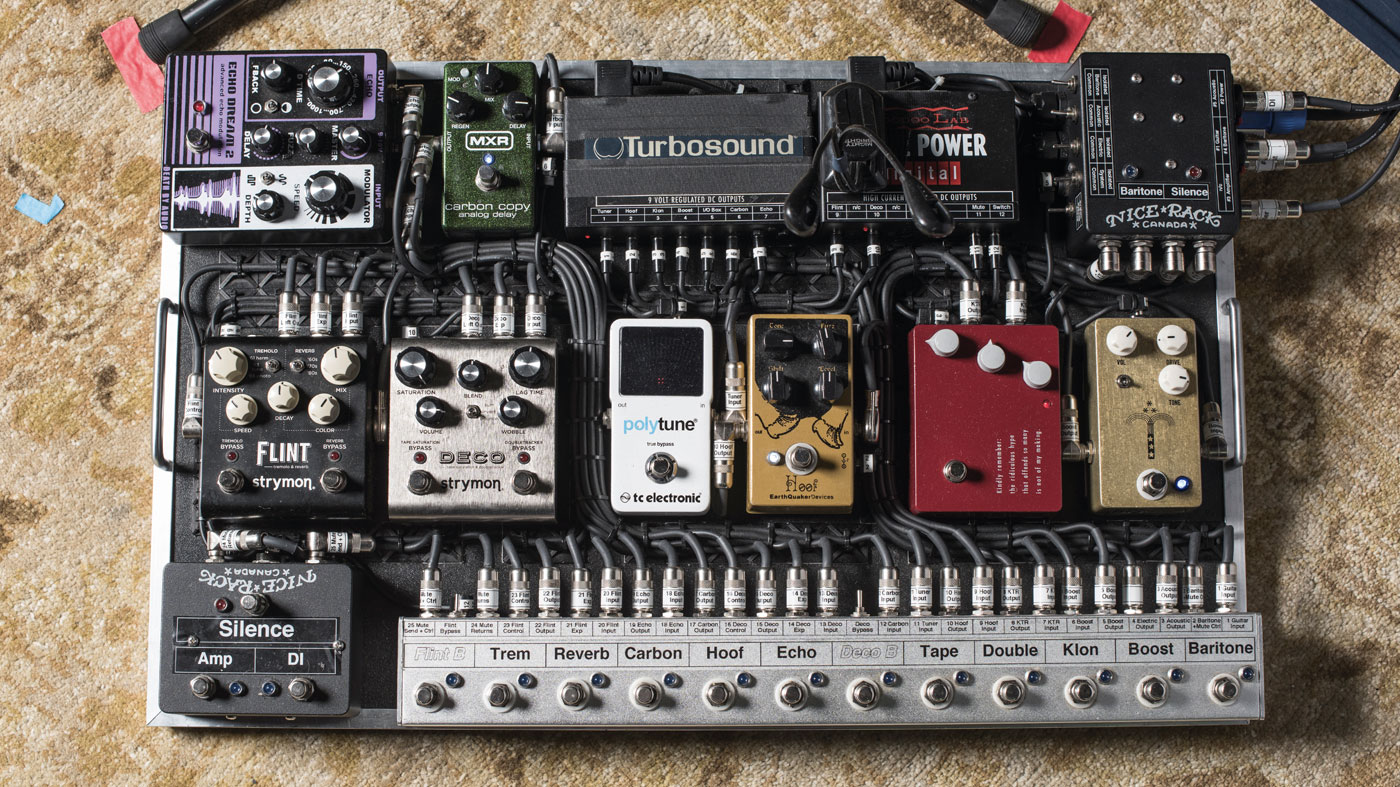
Dallas shows us his rig an immaculately organised pedalboard with City And Colour
“That was massive to me, knowing that there’s so much more to it than just playing the riffs. Nothing spoke to me as much as this album, sonically it just had so much going for it, it just made me want to get somewhat close to being able to do that in my bedroom.”
“I still have a couple of those pedals today that I still use. One of them was a Boss digital reverb, but it had all these settings on it so you could create weird swells and reverse sounds.
"Another one was the MXR Carbon Copy delay. We just went to our practice space the other day, and I miss playing with that pedal so I brought it back with me. Those two pedals were big pedals at the time for me, trying to figure out all these sounds and experiment, and trying to educate myself to be a better at translating sounds.”
7. Counterparts - The Current Will Carry Us (2011)
"I always hold that album close because that was my first ever tour, and it's kind of owed to that record"
“I think I heard this in maybe 2012. I’d just moved to London to go to university studying music for film. My housemate Phil was super into this band and wanted to start a melodic hardcore band. I hadn’t listened to much of that stuff, but I started listening to that album.”
“It was so melodic and there was so much energy, and I was like ‘Ok, I need to brush up on my playing ability’ because it was a little bit away from where I was technically. So it was inspiring, I think there’s something ingrained in me from pop music that means I’m always looking for that hook. With Counterparts, their guitar stuff is just ridiculously catchy. They used a lot of similar sounds to Alexisonfire, weird delays and stuff like that.”
“From there I got asked to join this band called Climates, and I ended up writing the first EP, musically, and again very heavily inspired by that Counterparts album. Then we got offered our first European tour, which was with Counterparts very coincidentally. It was very, very bizarre!
“But I always hold that album close because that was my first ever tour, and it's kind of owed to that record. I speak to them quite often, we see them out on tour. It’s weird how things turn out, one album makes me want to be in a band, tour, and then years later we’re friends with them.”
8. The Story So Far - Under Soil And Dirt (2011)
"It’s the type of music that makes me want to pick up a guitar and play"
“This was around a similar time, when I was in London. It’s classic pop-punk, and it was directly on the mark of what I love about music and different styles. It’s punk enough, upbeat and it’s got that energy, but the guitars are just so melodic. It’s almost like solos throughout the tracks, and riffs you can sing.
"It’s kind of like this perfect balance in music that sonically to me was like ‘Ok, I love this. This is probably exactly what I’d be be playing in a band’. And lo and behold, I ended up in Neck Deep, which is somewhat similar at least.”
“That album, again, is one of my most listened. I stuck it on every day for a few of years I think!
"It’s the type of music that makes me want to pick up a guitar and play, and also envision how it will go down live. They were a band where it was like, ‘This is going to be chaos live’. You can sing the guitar riffs, it’s fast-paced, the vocals are screaming and there’s a lead guitar just soloing the whole way doing it’s own thing. ‘I’m in!’.”
“Things I Can’t Change, I stuck with, but Story did a few things after that where it did go a bit too acoustic and pop for me. I know I’m a fine one to talk being in Neck Deep, that’s just released a bunch of pop-sounding songs, but something just didn’t hit it with me. But then their latest album is just amazing, it’s so good. I love that band, I wish we could tour together but that’s not happened yet, I’d love to.”
9. John Mayer - Room For Squares (2001)
"It’s a straight masterpiece"
“I can’t play any of this album, that’s for sure. It’s a straight masterpiece. I listen to this every time I travel. Every time I fly or have a long journey I’ll put this on. It was a weigh-up between this and his live album, because I listen to that every time!
"I’m a huge John Mayer fan, he’s just an unbelievable riff machine, and he plays the most technical stuff. But somehow as a listener it doesn’t feel like that, he makes it feel simple. I thought it was just mad for someone to be able to convey that.
“I was quite late to it, I didn’t hear it in the early 2000s, I was about 10 years late to John Mayer. But that says something about it being somewhat timeless too, that I was able to pick it up 10-plus years later and go ‘This is amazing, who’s this, has it just come out?’ No.
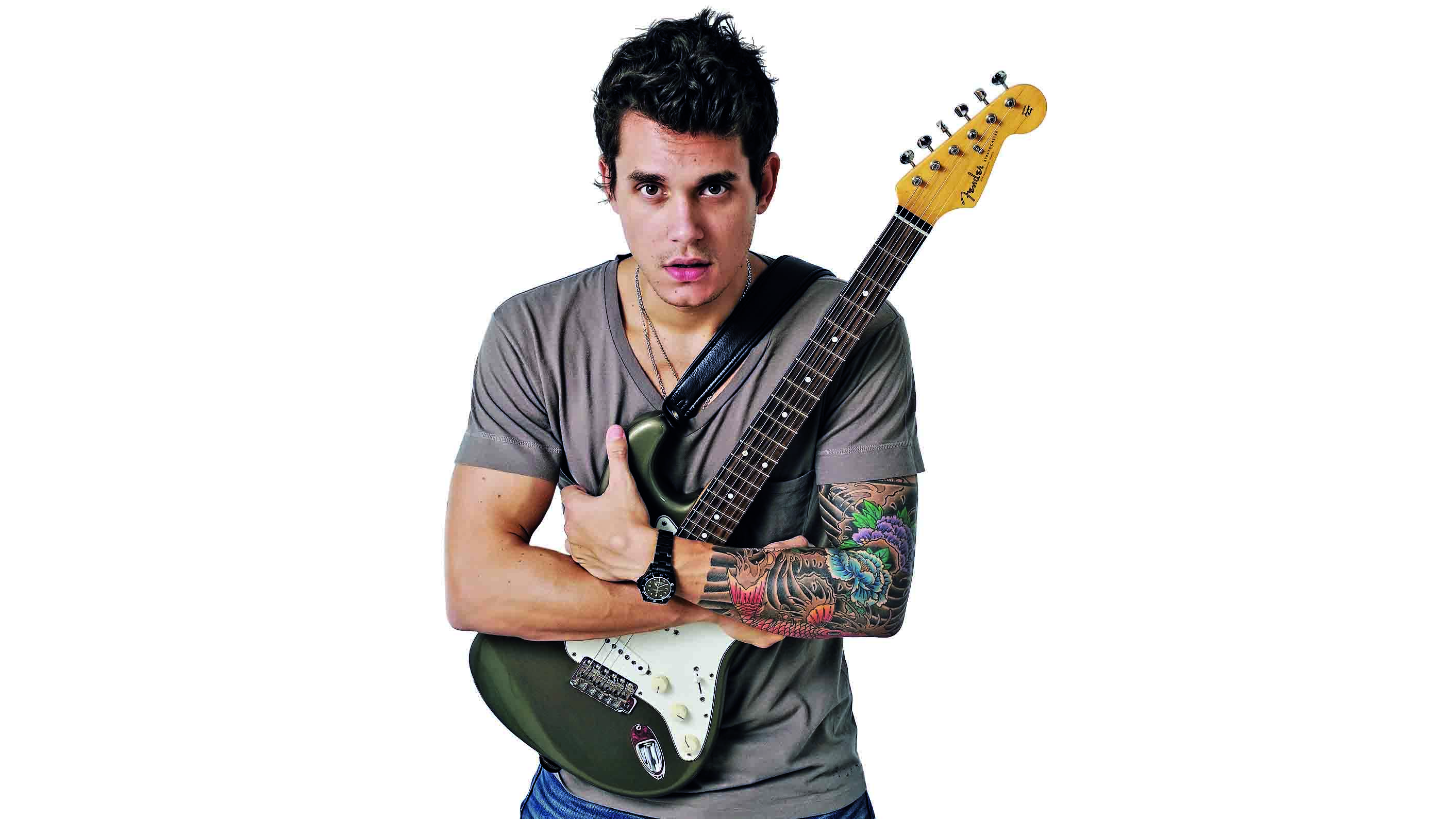
"I think he’s absolutely amazing. I got to see him this year and he didn’t play my favourite song, Neon. I was absolutely distraught about it!”
“Our sound engineer, Chris Miller is an unbelievable guitarist and on the Blink tour he was teaching me how to play a bunch of John Mayer stuff. We didn’t do Neon, I can promise you that! He was showing me it, and even he was reaching playing it.
"It’s so ridiculous, I don’t know how he came up with that. All the stretches he does with his chords, it’s ridiculous, and he’s singing at the same time! I don’t know how that exists! It’s one of the most motivating things for me, listening to him.”
10. The 1975 - The 1975 (2013)
"I think that band has done a lot for guitar music"
“Out of all of the records I’ve listed, this is the only one that’s from recent years. Since I started doing music, or at least pursuing it as a career, there’s not been too much music that’s kind of moved me or inspired me as much as this album.
"There’s definitely been good albums, and albums that I’ve really enjoyed listening to, but I don’t think I see myself in five to ten years - on certain albums - going, ‘This is still amazing!’”
“There’s something about The 1975 in general, but particularly this album that I’ve listened to a tonne. Especially with writing, I think there were songs on The Peace and The Panic that were heavily influenced by The 1975; In Bloom, Motion Sickness. There’s a bunch of leads and things, I was just playing so much of them at the time.
"As a band they’re just so consistent and nothing is wasted, whether it’s music, digital stuff, visual stuff, live stuff or the political issues they touch on. I think they’re doing a lot of the right things, accompanied by really inspiring music. So that has to at least make my top 10.
“They’ve massively brought [guitar music] back, and they’ve even paved the way for bands like us. When I joined Neck Deep it was just after Life’s Not Out To Get You had been released and I remember the band was getting radio play. But back then they didn’t want too much rock.
"Not that we’re a radio-driven band, but what’s funny is to know that from then when they only really wanted pop, to now on this campaign we sent out some of the more pop songs and they’re like ‘This is too pop, we want rock!’. So we changed it, and it’s because bands like The 1975 have come in with more rock and guitars, so now radio is like ‘Yeah, we like that now!’. So yeah, I think that band has done a lot for guitar music, making it more acceptable.”
Neck Deep's new album All Distortions Are Intentional is out now on Hopeless Record. Head over to neckdeepuk.com for the band's 2021 European tour dates.
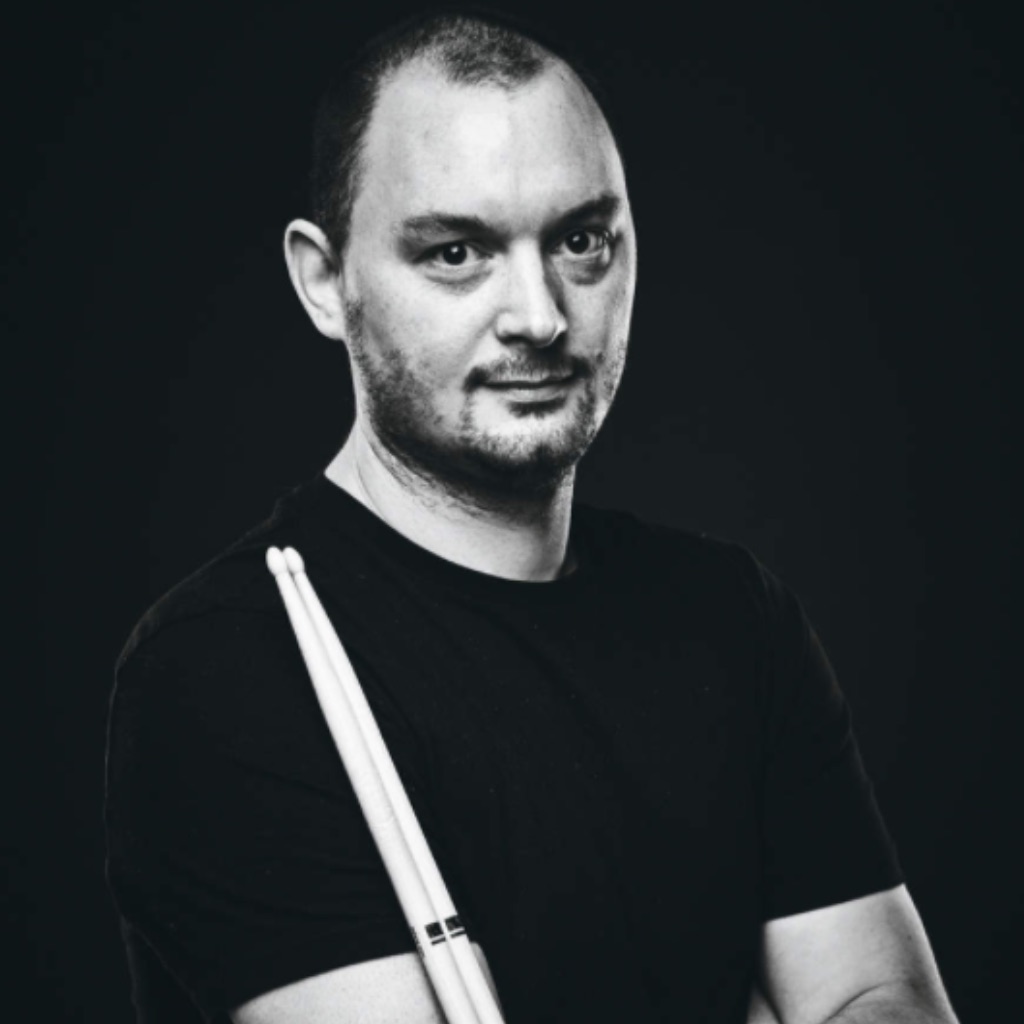
Stuart has been working for guitar publications since 2008, beginning his career as Reviews Editor for Total Guitar before becoming Editor for six years. During this time, he and the team brought the magazine into the modern age with digital editions, a Youtube channel and the Apple chart-bothering Total Guitar Podcast. Stuart has also served as a freelance writer for Guitar World, Guitarist and MusicRadar reviewing hundreds of products spanning everything from acoustic guitars to valve amps, modelers and plugins. When not spouting his opinions on the best new gear, Stuart has been reminded on many occasions that the 'never meet your heroes' rule is entirely wrong, clocking-up interviews with the likes of Eddie Van Halen, Foo Fighters, Green Day and many, many more.
